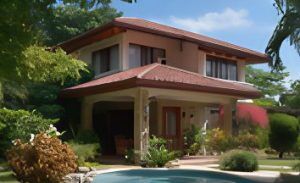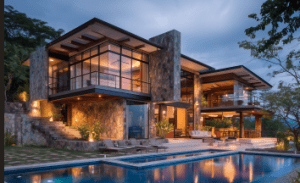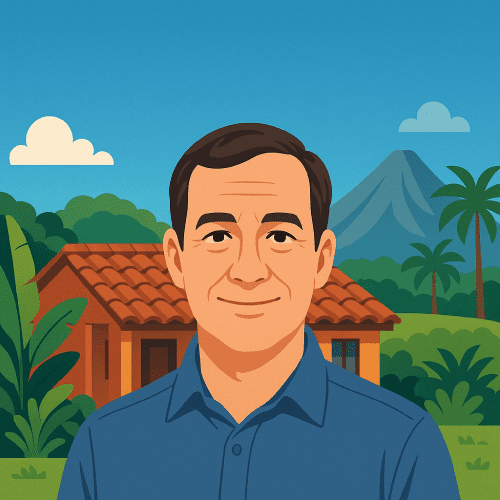How to Move to Costa Rica: A Guide for American Expats
-
Written by The Nestmann Group
- Reviewed by Brandon Roe
-
Updated: July 9, 2025






Contents
- Why Move to Costa Rica?
- #1. Stability and Legal Protections
- #2. A Global Diversification Opportunity
- #3. Affordable & Accessible Healthcare
- #4. Lower Cost of Living (Depending on Your Lifestyle)
- The Most Practical Residency Options for Americans Moving to Costa Rica in 2025
- #1. Pensionado Program (Retiree Residency)
- #2. Rentista Program (Fixed Income Residency)
- #3. Inversionista Program (Investor Residency)
- Other Visa Options & Information
- What to Know Before You Title Property in Costa Rica
- Common Foreign Real Estate Financing Structures for US Investors
- Build Your Costa Rica Strategy the Right Way, the First Time
- Sources
With political stability, good healthcare, and a legal system that protects foreign investors, it’s easy to see why more than 120,000 Americans now call Costa Rica home.
But learning how to move to Costa Rica isn’t just a matter of buying a beach house and packing your bags.
Free Wealth Protection Insights
Enter your email below to receive our weekly briefings on better ways to preserve your wealth, legally reduce your tax bill, and better protect what you’ve worked hard to build.
The Nestmann Group does not sell, rent or otherwise share your private details with third parties. Learn more about our privacy policy here.
PLEASE NOTE: This e-series will be delivered to you via email. You should receive your first message minutes after joining us. By signing up for this course, you’ll also start to receive our popular weekly publication, Nestmann’s Notes. If you don’t want to receive that, simply email or click the unsubscribe link found in every message.
Residency laws, lifestyle differences, and local property rules can trip you up if you don’t have a clear plan. If moving to Costa Rica is on your radar, treat it like you would any serious investment:
-
Get the facts.
-
Understand the risks.
-
Structure it right from day one.
And that’s what this guide is here for.
Why Move to Costa Rica?
For the right person, Costa Rica delivers an ideal combination of lifestyle, legal stability, and long-term opportunity.
Here’s why many of our clients choose it.
#1. Stability and Legal Protections
Costa Rica’s democracy has been stable for more than 70 years – though not without its fair share of alleged corruption. Nonetheless, the country’s decision to get rid of its military helps it stay neutral and frees up more resources to invest in healthcare, education, and other public services.
Property rights are protected under the law, and foreigners can own land with the same legal rights as locals – something not all countries offer.



Are these the best Income-Producing Properties in Costa Rica?
That’s for you to decide. But enter your email address below to receive a summary of pre-vetted, turn-key short-term rental properties available in Costa Rica right now.
The Nestmann Group does not sell, rent or otherwise share your private details with third parties. Learn more about our privacy policy here.
By signing up for this briefing, you’ll also start to receive our popular weekly publication, Nestmann’s Notes. If you don’t want to receive that, simply email or click the unsubscribe link found in every message.
#2. A Global Diversification Opportunity
For clients looking to internationalize part of their wealth, Costa Rica offers a practical and relatively low-friction option.
-
Real estate is affordable compared to many popular US locations. (although you can still sometimes expect to pay the “gringo premium”.)
-
Structures like the Sociedad de Responsabilidad Limitada (SRL, like an LLC in the US) make property planning and inheritance much simpler.
-
And for those seeking a second residency, Costa Rica has some of the most accessible legal pathways in the region.
Even modest steps – like owning a home abroad or setting up a local business – can increase your financial resilience in uncertain times.
Read more: Real Estate in Costa Rica for Expats: A Strategic Asset for Wealth Protection
#3. Affordable & Accessible Healthcare
Costa Rica’s public healthcare system (CCSS) is universal, and all legal residents must enroll. While it does have wait times – and staffing issues – the quality of emergency and preventive care is generally high.
Expats also have the option to choose private insurance, which offers faster access to specialists and private clinics. And some private hospitals – like CIMA and Hospital Clínica Bíblica in San José – provide good care with English-speaking staff.
#4. Lower Cost of Living (Depending on Your Lifestyle)
While the cost of living in Costa Rica is rising, you can still live well in Costa Rica on less than $3,000 per month as a single person or couple – or you can spend much more. It depends where you settle and how you live.
Inland towns like Atenas or Grecia are popular for their temperate climate and low costs. Coastal areas are more expensive – but still lower than popular coastal US towns.
For instance, a beachfront condo in a coastal area of Costa Rica – like Tamarindo or Santa Teresa – will likely run you anywhere between $170,000 and $600,000.
Compare that to beachfront condos in San Diego, California, going for as high as $4 million – according to Zillow – and you quickly realize that a very similar (if not the same) beachfront view in Costa Rica costs a whole lot less.
Read more: Safes places to live in Costa Rica
#5. A Gentle Landing for First-Time Expats
Costa Rica isn’t perfect (no place is) – but it’s one of the easier places for Americans to adapt:
-
English is widely spoken in key areas.
-
There are strong expat communities across the country.
-
It’s a short flight from the US.
-
The culture is welcoming, and the pace of life is slower – in a good way.
For Americans looking to start small – with a rental, a long stay, or an exploratory year – Costa Rica is a good option to consider.
We asked one of our clients living in the area around San Jose: What surprised you about living in Costa Rica?
“How robust Costa Rica’s democracy is, how well the government is structured for the benefit of all, how free and fair its elections are, with many guardrails to keep democracy strong.”
And what do you love most?
“The Tico people who warmly welcomed us and are endlessly patient with my Spanish. I feel very much like I have arrived home.”
Real planning leads to real peace of mind – and, for many, a sense of belonging they never expected.
The Most Practical Residency Options for Americans Moving to Costa Rica in 2025

But before you start looking at places to live in Costa Rica, you’ll have to figure out how to legally live there in the first place.
Costa Rica has long welcomed foreign residents. And while the rules aren’t overly complex, picking the right path matters – especially if you plan to stay long-term or integrate real estate into your broader wealth plan.
Below are the three most common residency options for Americans today – and how they stack up for different situations.
#1. Pensionado Program (Retiree Residency)
If you’re collecting a lifetime pension of at least $1,000 per month, this is the easiest door to walk through.
-
What qualifies: Social Security, government pensions, private company pensions, or annuitized retirement income.
-
Family-friendly: You can include a spouse and dependent children under 25 on your application—no need to prove extra income.
-
Low presence required: Just one day per year in Costa Rica to maintain your residency.
This program is ideal for retirees looking for a simple, low-maintenance way to establish legal status – while keeping US planning intact.
#2. Rentista Program (Fixed Income Residency)
Not retired yet? You can still qualify – if you have predictable, passive income.
-
Income requirement: $2,500 per month for 24 months, or proof of $60,000 in savings.
-
Source of funds: Must be passive – investments, rental income, or trust disbursements. Regular job income doesn’t count.
This option works well for early retirees, trust beneficiaries, or those with income from real estate or investments.
#3. Inversionista Program (Investor Residency)
If you’re planning to purchase property or launch a business in Costa Rica, this path may offer the most flexibility.
-
Minimum investment: $150,000 in Costa Rican real estate, a local business, or approved securities.
-
Renewable status: Temporary residency is granted for two years at a time.
-
Path to citizenship: Apply after seven years (or five years if you’re from Spain or Ibero-America).
This program can complement other planning strategies – especially for clients who want real estate and a legal foothold in Latin America.
Even if you purchase a million-dollar home in Costa Rica, you’re still limited to 90-day tourist stays unless you formally apply for residency.
But if you invest at least $150,000 in real estate, you can use that investment to qualify for the Inversionista Program.
So while property ownership alone doesn’t grant residency, it can absolutely become your pathway to it.
Other Visa Options & Information
Costa Rica’s government has made the process easier in recent years:
-
Faster processing: Most residency applications are now approved within 9 to 12 months.
-
Digital Nomad Visa: Introduced in 2022 for remote workers earning at least $3,000/month ($4,000 with dependents). This visa allows legal stay for up to a year with the option to renew for another year – so long as you can prove you’ve resided in Costa Rica for at least 180 days.
-
Cuenta Propia (Self-Employed Visa): For licensed professionals or freelancers with proof of ongoing income and legal certifications.
-
Spousal Visa: Available to foreigners married to Costa Rican citizens; valid for one year and renewable twice.
Most temporary residency types can be upgraded to permanent residency after three years, and foreigners become eligible for citizenship after seven years of legal stay.
What to Know Before You Title Property in Costa Rica
Planning to own your new home in Costa Rica?
So long as you set it up correctly – from the beginning, based on your goals – your Costa Rican property ownership journey doesn’t have to be an expensive headache.
Because it’s not simple – but it’s not too hard, either.
Read more: Buying Property in Costa Rica as an American: The Complete Guide for 2025
#1: Direct Ownership: Simple, But Risky
Buying in your personal name is the easiest path up front – but with important caveats:
-
No liability protection if someone gets hurt on your property.
-
No privacy – your name is tied to public records.
-
And when you die, your heirs must go through mandatory probate – a costly and time-consuming legal process.
If your property goes through notary probate (the best-case scenario, without disputes), you can generally expect notary fees alone to reach $20,000 for a $300,000 home. Add transfer taxes and registry costs – and the price tag quickly adds up.
If it goes through judicial probate (the worst-case scenario, with disputes and for certain types of heirs), expect the process to take a lot longer – and cost a lot more.
#2: Corporation Ownership: The Smarter Move for Most
A better approach is to hold the property through a Costa Rican entity – usually an SRL (Sociedad de Responsabilidad Limitada) or, less commonly, an SA (Sociedad Anónima).
Here’s why the SRL is preferred:
Limited liability for accidents, debts, or disputes.
Tax flexibility – rental income and capital gains can be reported more efficiently.
Low maintenance – inactive companies pay about $120 annually to keep things active. Active companies (those with rental income or business activity) can expect to pay $1,200 to $1,500 annually, depending on local accounting fees and required filings (like tax returns and telling the government who owns the company).
If structured correctly, a US LLC or trust can even own the SRL, integrating the property into your domestic estate plan without triggering local probate.
#3: Trust Structure: Best for High-Value or Complex Cases
For more advanced planning, an irrevocable Costa Rican trust (known as a fiso or fideicomiso) may be worth considering.
- Avoids probate entirely if structured properly.
- Ideal for high-value properties or complex family arrangements.
- Requires using a regulated trustee agency – which adds cost but also legal certainty.
Trusts typically make sense when property values exceed $1 million or when you need specific controls over asset distribution. However, they’re usually the most expensive option.

CLIENT CASE STUDY:
PROBATE AVOIDANCE FOR A COSTA RICAN PROPERTY
Background:
A client came to us with a clear objective: avoid probate in Costa Rica for their property. Their concern was well-founded.
Probate in Costa Rica can drag on for years – up to a decade in worst-case scenarios – and can cost tens of thousands of dollars. For families left behind, it often means legal delays, court headaches, and frozen property they cannot sell or use.
The client wanted to ensure their heirs would not be stuck navigating Costa Rica’s complex probate system – especially from abroad.
Problem:
We spoke with a trusted local attorney, who confirmed the challenge: while Costa Rica has a centralized land registry, its probate system is anything but efficient. Even small estates can face long delays and high legal costs.
The client was exploring ways to structure the property to avoid these issues – but found that the most protective tool available under Costa Rican law, the Fideicomiso (Fiso) trust, was prohibitively expensive. While effective, the Fiso adds thousands in legal and maintenance costs over time.
They wanted a better solution.
Potential Options Explored:
We examined the standard local structures:
- Sociedad Anónima: Common corporate format but better suited for commercial activity.
- Sociedad de Responsabilidad Limitada: More flexible and widely used for real estate holdings.
- Fiso Trust: Strong legal protection and probate avoidance, but costly to set up and maintain.
- Direct ownership: Simple, but offers no probate or liability protection.
None of these options provided the ideal mix of affordability, flexibility, and estate integration – until we introduced a hybrid solution.
Solution:
We recommended using a US Limited Liability Company (LLC) to hold the quotas of a Costa Rican SRL.
How It Helped:
This structure gave the client three major benefits:
- Cost Efficiency: The US LLC was far less expensive than the Fiso and avoided annual trust fees.
- Probate Avoidance: Upon death, the US LLC could be managed through a domestic estate plan, allowing shares to transfer under US rules – not Costa Rican court supervision.
- Estate Integration: The LLC could be owned by a US trust or passed through a will, just like any other domestic asset – keeping everything under one umbrella.
Lesson:
When it comes to owning property abroad, estate planning doesn’t stop at the border. By combining domestic tools (like US LLCs and trusts) with local structures (like an SRL), you can often get the best of both systems – without overspending.
In this case, the client got what they wanted: a structure that avoided probate, reduced costs, and integrated seamlessly into their US-based estate plan.
#4: Property Ownership Restrictions You Should Know
If your dream includes a beachfront home, there’s one more thing to watch:
- Costa Rica’s Maritime Zone extends 200 meters inland from the high tide line.
- The first 50 meters is public land – no one can own it.
- The next 150 meters are concession land, and foreigners may only own 49% unless they’ve had legal residency for five years or more.
Most inland properties don’t have these restrictions, but always verify zoning and titling before buying.
Read more: Navigating Costa Rica Property Ownership Laws as a US Citizen
Avoiding the Most Common Mistakes American Expats Make
We asked Javier Sauma, a Costa Rican attorney we work with, about some common oversights he sees Americans make when relocating to Costa Rica – and how to avoid them with proper planning on both sides of the border.

Q: How common is it for Americans relocating to Costa Rica to overlook their ongoing legal obligations in the US?
A: Not so common, but it happens. We often encourage clients to treat relocation not as a clean break, but as a legal transition that requires careful coordination between US and Costa Rican jurisdictions.
Many international clients arrive in Costa Rica drawn by proximity, lifestyle, climate, and often seeking a slower pace. However, in the excitement of relocating, it’s easy to overlook ongoing legal and tax responsibilities back in the US, or even those applicable per Costa Rican law as US citizens.
If you are thinking about moving to Costa Rica yet continue to own or control companies and/or properties in the US (either personal or real property), make sure to set up a practical structure back home, to ensure compliance with federal and state obligations. Think about a mirroring strategy in both countries, which is highly feasible. Despite having different systems, Costa Rica and the US are highly compatible in legal planning.
Q: What legal mistakes do Americans most frequently make when establishing residency or relocating to Costa Rica?
A: Costa Rica is a welcoming and friendly country, but one of the frequent mistakes occurs when underestimating the residency or relocation process. Legal accompaniment before and during relocation is highly advisable.
From experience, American clients tend to be well organized and respectful of the Costa Rican legal system, yet common mistakes have been identified in the following aspects:
- When applying for legal residency or thinking of doing so upon arrival to Costa Rica, some clients obviate that the core initial documents for filing legal residency must be obtained personally in the US, such as birth certificate issued by the state in which the person was born and a federal background check with validity of no less than 6 months. All documents must be apostilled to have effects in Costa Rica.
- Other identified mistakes occur when some American clients intend to bring their funds to Costa Rica, whether for acquiring a property or any other reason. Banking regulations in Costa Rica are complex and rigorous and only authorized agents can handle third party funds. Make sure to have legal advice on this process to secure key documentation while you are in the US, but also to comply with the Know Your Client policies that will be applied by all financial entities.
- Lastly, some Americans clients have made the mistake of overlooking the need for a proper legal and technical due diligence when purchasing property or starting a business in Costa Rica. Acquiring real estate in Costa Rica can be a valid vehicle to obtain legal residency, but make sure to make a calm decision and respect the process without hurrying, so that your investment is worthwhile in every aspect.
We also asked one of our tax resources, Greenback Tax Services, to weigh in…
What are the most common tax mistakes Americans living in Costa Rica tend to make?
Here are some recurring issues we see in our Costa Rica-based clients:
-
Assuming the Costa Rican tax year matches the US: Costa Rica’s tax year follows the calendar year, but confusion still arises when people try to match local income timelines to US requirements, leading to reporting gaps or misstatements, especially for self-employed individuals.
-
Miscalculating eligibility for the Foreign Earned Income Exclusion (FEIE): FEIE is only available if you meet strict residency tests. Many Americans in Costa Rica split their time between the US and Central America, not realizing that a brief return to the US can disqualify them, resulting in unexpected tax bills if not planned correctly.
-
Filing state returns when no longer necessary: Some expats continue filing US state tax returns—particularly in California or New York—without realizing they could sever ties and stop. However, each state has its own rules for determining residency, and failing to take proper steps (like selling a home, changing voter registration, etc.) can leave them open to ongoing state audits or tax notices.
Moving to Costa Rica can be rewarding – but jumping in too fast, without a solid plan, can often be frustrating.
Here are the mistakes we see most often:
#1: Banking Headaches
Costa Rica’s banking system is tightly regulated. Since signing the Inter-American Convention Against Terrorism in 2002, local banks have introduced stricter account-opening requirements.
-
Most banks require legal residency to open a full-service account.
-
Some banks sometimes allow non-residents to open accounts, but with limits.
-
And some banks tend to be more expat-friendly than others.
What to expect:
-
Multiple in-person visits.
-
Long processing times (often weeks).
-
Higher fees for non-residents.
-
Language barriers at state banks – many private banks offer English-speaking staff.
#2: Misunderstanding the Healthcare System
Once you become a legal resident, you must join Costa Rica’s national healthcare program (Caja or CCSS). Contributions are based on reported monthly income – usually 9% to 11%.
But most expats also buy private insurance to reduce wait times and access private clinics.
The mistake is failing to plan and budget for both systems – and being caught off guard by delays or coverage gaps.
#3: Skipping Legal Due Diligence on Property
Costa Rica has a centralized property registry – but the legal system still demands proper documentation and title checks. This is not a place to “go with your gut.”
You should always:
Verify title and ownership history.
Check for liens, easements, or zoning issues.
Confirm property boundaries.
#4: Overlooking Real-World Living Differences
Moving abroad isn’t just a paperwork exercise – it’s a lifestyle change. Too many expats underestimate the daily adjustments.
Here’s what to consider:
-
Language: Basic Spanish is helpful; fluency is needed to integrate fully.
-
Infrastructure: Power and water outages still happen, especially in rural areas.
-
Healthcare: Emergency care is strong, but non-urgent cases can involve long waits.
#5: Losing Residency by Mistake
Residency in Costa Rica comes with a few simple – but important – rules:
-
To keep your temporary residency, you must spend at least one day per year in the country and maintain your qualifying investment or income.
-
To qualify for permanent residency after three years, you must visit Costa Rica at least once per year during that time.
Some Americans try to live long-term on a tourist visa by doing border runs every 90 days. But Costa Rica is tightening those loopholes and encouraging proper residency applications.
Try Before You Commit
The best approach? Test the waters.
Before you sell your home or move your business, try living in Costa Rica for six to twelve months (or work with experts who’ve done it already):
-
Rent a home with your tourist visa or apply for a digital nomad visa if you have remote income.
-
Put your US belongings in storage.
-
Live like a resident. Shop local, drive the roads, use the healthcare system.
After a year, you’ll know if Costa Rica fits your values, pace, and long-term goals.
Some people fall in love with the slower lifestyle and strong sense of community. Others realize it’s not the right fit. Either outcome is valuable – but only if you plan it properly.
Build Your Costa Rica Strategy the Right Way, the First Time
Moving to Costa Rica can offer real advantages – great weather, lower costs, and political stability – with the right planning. But moving here isn’t just a lifestyle upgrade. It’s a key part of a broader Plan B.
The most successful expats treat Costa Rica as one piece of a larger international strategy. They think beyond just one country or property – and plan around taxes, residency, and legacy.
Start with your goals. Are you retiring full-time? Looking for a winter home? Making an investment? Your answers shape the right path – from residency to property structure to tax planning.
Work with experts who know both US and Costa Rican law. It’s far cheaper to plan correctly than to fix mistakes later.
When you’re ready to build a serious Plan B that includes Costa Rica, feel free to get in touch. We’ll help you get every piece in place – from residency to real estate and estate planning.
Sources:
-
Cafetico. (2023, May 2). Why Costa Rica has no army: The bold decision that changed a nation forever. https://www.cafetico.io/blogs/news/why-costa-rica-has-no-army-the-bold-decision-that-changed-a-nation-forever-2
-
Improving Primary Health Care. (n.d.). Costa Rica: Access. https://www.improvingphc.org/costa-rica-access
-
Senderos. (2024, January 23). Cost of living in Costa Rica. https://senderos-cr.com/cost-of-living-in-costa-rica
-
Zillow. (n.d.). California beachfront condos. https://www.zillow.com/ca/condos/?searchQueryState=%7B%22pagination%22%3A%7B%7D%2C%22isMapVisible%22%3Atrue%2C …
-
Clínica Bíblica. (n.d.). International patients. https://www.clinicabiblica.com/en/
-
Hospital CIMA. (n.d.). About us. https://hospitalcima.com/en/about/
-
U.S. Congress. (2001). Inter-American Convention against Terrorism. https://www.congress.gov/treaty-document/107th-congress/18/document-text
-
Hidden Coast Realty. (n.d.). Condos for sale in Tamarindo Costa Rica. Retrieved June 24, 2025, from https://hiddencoastrealty.com/condos-for-sale-in-tamarindo-costa-rica/
-
Langston Realty. (n.d.). Santa Teresa condos for sale. Retrieved June 24, 2025, from https://www.langstonrealty.com/areas/santa-teresa-real-estate/santa-teresa-condos-for-sale
About The Author
We have 40+ years experience helping Americans move, live and invest internationally…
Need Help?
We have 40+ years experience helping Americans move, live and invest internationally…







